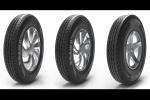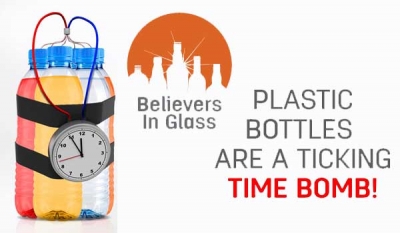Even the SAFEST OF SAFE claimed plastic leaches dangerous chemicals which disrupts your entire body.
We are so conscious of what we eat and drink, but do not pay any attention to what it is stored in, without realizing that it is this very packaging which is responsible for various health problems, from cancer, diabetes, infertility, miscarriage, birth defects to asthma.
How is it relevant to us?
Plastic menace has increased to a level, that if tested all of us have significant measurable quantities of plastic chemicals in our body, proven by the best of Global Institutes.
The situation is alarming in our country, where the average temperatures varies around 30- 35 degrees, and it is a proven fact that leaching of harmful and dangerous chemicals from plastics is time and temperature dependent, which means longer the duration and higher the temperature that food, water, medicines are stored in plastic containers, more the leaching.
“Plastics and their additives aren’t just around us, they are inside virtually every one of us— present in our blood and urine in measurable amounts, ingested with the food we eat, the water we drink and other sources.
While the potential harmful effects of such toxins and chemicals could fill a chapter, it is time for us to demand our right to choose a safe packaging that is Glass.”
“In this world where plastic is omnipresent, we need to wake up over this looming health epidemic.
Besides the fact that such bottles carry the hazard of toxic exposure, the passage of bisphenol A (BPA) and additives like Di-ethylhexyl Phthalate (DEHP) which gets leeched onto its contents, can lead to significant long term medical consequences.”
Dr Waruna Gunathillaka, Head Department of Toxicology and National Poison Information Center.
The fact that such PET/plastic bottles have been tested for permissible levels of phthalates, antimony, acetaldehyde etc., for storage at temperatures of around 20o C.
This potential endocrine disruptor leaching, increases to as high as 4 times the permissible limit, at higher temperatures which are prevalent in our country.
A point to note is that prolonged storage also results (beyond 120 days) in toxic loading of the harmful leeching. Thus, unnecessarily prolonging shelf life should also be discouraged.
But aren’t they superior food grade plastics?
Research has now proven that even the safest of safe plastic like BPA, leaches dangerous chemicals and there is no such thing as safe plastics, Global study now has established it without doubt, that no plastic is safe for Human exposure.
“In a study done in our country it was discovered that the levels of harmful toxic heavy material were significantly higher than that of permissible levels, at those levels we are definitely consuming nothing less than poison.
This problem is compounded as we do not have proper cold chain and storage across the country.
Dr A A P Keerthi, Secretary, Institute of Chemistry Ceylon.
So, what are these dangerous chemicals?
There are many, but the most worrisome are heavy toxic metals like Arsenic, Acetaldehyde, Endocrine disruptors, like Phthalates, DHEP etc.
Women (in the reproductive age group) and children consuming this potion out of such bottles could have impaired immune development, loss of pregnancy, pre- term birth, low birth weight and congenital defects in the child which could manifest in later life.
Most serious proven impact is 78% increased risk of breast cancer cells and a rise in hormone dependent cancers like prostrate and breast cancer” said Prof. Kolith Sellahewa, Prof of Medicine, Consultant Physician.
Whom do they affect?
Practically everyone is affected by plastic or PET container leaching, leading to various problems like, respiratory, cardiovascular, gastrointestinal disorder.
It causes attention deficit disorder, endocrine disorder, diabetes and obesity.
Endocrine disorder again, leads to early onset of puberty in young girls, PCOS and increase in prostate breast cancer.
“It is also one of the root causes of infertility.
PET bottles may have long term medical consequences on women, especially during the growing up years and pregnancy.
The release of Bisphenol A (BPA) and additives like diethylhexyl phthalate can blend with the contents of the bottle and lead to health issues such as impaired immune development, increased miscarriage rate and pre-term birth.
BPA acts as false estrogen and can cause chromosomal abnormalities, birth defects and developmental disabilities in childhood.
Its exposure is also linked to hyperactivity disorders and aggression in young girls, based on these facts on the principle of safety first principle RCOG and American Society of Reproductive Medicine and International Federation of Fertility Societies have also requested the government of United States of America for a similar action.”
Said Dr Suranga Hettipathirana, Senior Lecturer and Consultant Gynaecologist and Obstetrician.
Estrogen disruptors mimic and interfere with the action of estrogen–a hormone that helps us develop when we’re young and eventually reproduce.
These leached chemicals have been widely detected in blood, urine, amniotic fluid and breast milk, and have been found in nearly all adults and children who have been tested.
For these multiple reasons, scientists are concerned about its effects on fetuses, infants, and children at current exposure levels, and whether it can affect the prostate, brain, testicles, breasts, and behavior.
Studies suggest that the more a baby is exposed to estrogen while in the womb, the greater the risk of breast, testicular and prostate cancer later in life.
Dr Arbinder K. Singal, Pediatric Urologist, MBBS (Gold Medalist), M. Ch. Ped. Surg. (AIIMS Gold medalist), DNB, MNAMS, Stecker Fellowship in Pediatric Urology, OSU, USA said, “The effects of the exposure are, seen in children, but the major problem is that in utero exposure, as a dose of these disrupting chemicals can do substantial damage to a developing fetus (baby), causing problems of sexual male organ development, and the dangerous aspect is that this impact can be seen in the next generation as it impacts our genes.
Some of the common problems of concerns are Learning Disabilities, Severe Attention Deficit Disorder Cognitive and Brain Development Problems, Deformations of The Body (Including Limbs); Sexual Development Problems, Feminizing Of Males Or Masculine Effects On Females.”
Dr Neville D. Perera, Professor of Surgery, Consultant Genitourinary Surgeon said, “Globally there has been an increase in male reproductive disorders and a significant rise in incidence of genital abnormalities in new born babies, approximately a threefold increase in the last 40 years.
Many investigators link this sudden increase to chemical exposures in the environment which interfere with the sex hormones during development and sex differentiation which happens during 8-12 weeks of fetal development.
Exposure to Endocrine Disruptor Chemicals (EDC’s) during first trimester significantly increases these chances.
These EDC’s, such as phthalates and bisphenol-A are widely used in plastic bottles, vinyl floors, food wrappers, medical products, and toys.
It is time that we wake up to the environmental hazards which we face.
Possible steps would be to institute a ban on production of chemicals which lead to such severe disorders.”
About Believers of Glass
Believers of Glass believes that glass is the healthiest and safest packaging material for the community and the environment, mainly since glass is 100% recyclable.
It is our fundamental right to choose the packaging for our food, water and medicines.
We believe that the best option is to use the safest of safe packaging and that glass should be available for everyone.
For the last year we are relentlessly working towards creating awareness for HEALTHY PACKAGING.
Photo Caption
1.) Panelists from Left: Dr. Suranga Hettipathirana, Senior lecturer and Consultant Gynecologist and Obstetrician, Prof. Kolitha H. Sellahewa, Prof of Medicine, Head Department of Medicine SAITM, Consultant Physician, Prof. Neville D. Perera, Professor of Surgery, Distinguish professor at Post Graduate Institute of Medicine Consultant Genito Urinary (Urology) Surgeon, Dr. Lakkumar Fernando, President of the Sri Lanka College of Pediatricians and Dr. Waruna Gunathillaka, Head of Department of Toxicology and National Poison Information Center, National Hospital
2.) Dr. Suranga Hettipathirana, Senior lecturer and Consultant Gynecologist and Obstetrician
3.) Prof. Kolitha H. Sellahewa, Prof of Medicine, Head Department of Medicine SAITM, Consultant Physician
4.) Prof. Neville D. Perera, Professor of Surgery, Distinguish professor at Post Graduate Institute of Medicine Consultant Genito Urinary (Urology) Surgeon
5.) Dr. Lakkumar Fernando, President of the Sri Lanka College of Pediatricians
6.) Dr. Waruna Gunathillaka, Head of Department of Toxicology and National Poison Information Center, National Hospital
7.) Dr. Mamta Jain and Dr. A A P Keerthi, Secretary, Institute of Chemistry Ceylon



























